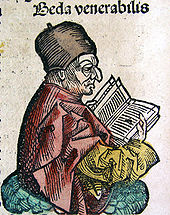.
St. Bede the Venerable ---- Patron Saint of Scholars ---- Doctor of the Church.

.
Saint Bede the VenerableSaint of the Day for May 25(c. 672 – May 25, 735) -- [This is one of the few saints Newchurch did not move away from the Feast Day of his death. One could say he managed to work a modern-day miracle surviving the shuffling cards of the Newcalendar scheme!]SourceAudio PlayerUse Up/Down Arrow keys to increase or decrease volume.Saint Bede the Venerable’s StoryBede is one of the few saints honored as such even during his lifetime. His writings were filled with such faith and learning that even while he was still alive, a Church council ordered them to be read publicly in the churches.At an early age, Bede was entrusted to the care of the abbot of the Monastery of St. Paul, Jarrow. The happy combination of genius and the instruction of scholarly, saintly monks, produced a saint and an extraordinary scholar, perhaps the most outstanding one of his day. He was deeply versed in all the sciences of his times: natural philosophy, the philosophical principles of Aristotle, astronomy, arithmetic, grammar, ecclesiastical history, the lives of the saints and especially, holy Scripture.From the time of his ordination to the priesthood at 30—he had been ordained a deacon at 19—till his death [d. 62]
, Bede was ever occupied with learning, writing, and teaching. Besides the many books that he copied, he composed 45 of his own, including 30 commentaries on books of the Bible. [Averaging 1 book every 9 months, without a word processor!]
His Ecclesiastical History of the English People is commonly regarded as of decisive importance in the art and science of writing history. A unique era was coming to an end at the time of Bede’s death: It had fulfilled its purpose of preparing Western Christianity to assimilate the non-Roman barbarian North. Bede recognized the opening to a new day in the life of the Church even as it was happening.Although eagerly sought by kings and other notables, even Pope Sergius, Bede managed to remain in his own monastery until his death. Only once did he leave for a few months in order to teach in the school of the archbishop of York. Bede died in 735 praying his favorite prayer: “Glory be to the Father, and to the Son, and to the Holy Ghost. As in the beginning, so now, and forever.”
ReflectionThough his History is the greatest legacy Bede has left us, his work in all the sciences, especially in Scripture, should not be overlooked. During his last Lent, Bede worked on a translation of the Gospel of Saint John into English, completing it the day he died. But of this work “to break the word to the poor and unlearned” nothing remains today.
Saint Bede the Venerable is the Patron Saint of:Scholars.There is a parish Church in my area named "Venerable Bede" which I thought was a bit unusual for a parish name. (In my experience by "venerable" would be implied the first stage toward canonization -- followed by beatification "Blessed" -- and "Saint," perhaps lending a somewhat less-than-saint aspect to its connotation.) So I stopped in there one day when I was passing through; it is located physically near JPL north of Pasadena, CA. I found a priest there so I took the opportunity to ask about the parish name. He said that St. Bede is definitely a saint, but he was traditionally and popularly known as "Venerable Bede" as far back as in his own time, so the name stuck. It has endured for over 12 centuries that way, so when this parish was founded there wasn't any reason to change such a venerable tradition -- he said with the hint of a smirk.
.
I don't see any mention of him being canonized Saint prior to his being declared Doctor of the Church by Pope Leo XIII in 1899.
Nor is there any mention of him being beatified.
So apparently he was Venerable by popular demand for centuries, and then skipped the next two steps going straight to Doctor!
Stranger things have happened in the Church.
For example, none of the Apostles were ever canonized but they're all saints.
St. Philomena wasn't canonized but she was "raised to the altars" by Pope Gregory XVI.
.
(I'll refrain from comments regarding apparent canonization of recent popes.)
.
The Wikipedia article seems bent on debunking any connection to the apellation "Venerable" contemporary with St. Bede:
.
From Wikipedia:


.
134. Ward 1990, pp. 136-38
135. Ward 1990, p. 139
139. Wright 2008, p. 4 (caption)
37. Fr. Paolo O. Pirlo 1997 ...
140. Catholic Encyclopedia ...
8. Higham 2006